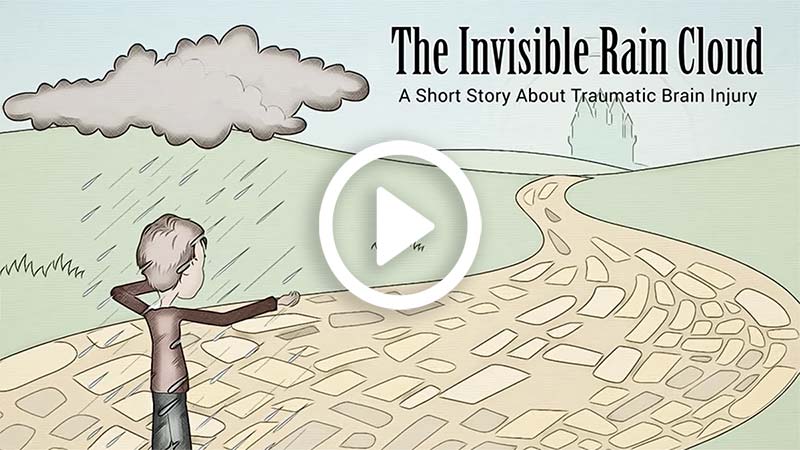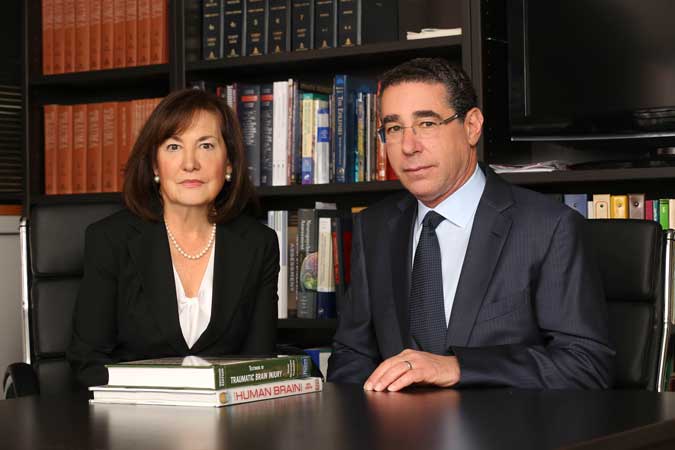The Invisible Rain Cloud
A Short Story About Traumatic Brain Injury

Why We Created This Video
If you’re a traumatic brain injury survivor, are you frustrated by being told how lucky you are? How your injury could have been much worse? How you look great? For those suffering from a TBI it’s difficult to explain how they feel. While every TBI is different, and everyone experiences their injury in a unique way, The Invisible Rain Cloud video attempts to explain some of the common symptoms and feelings an individual may experience in life after brain injury.
Brain injury survivors confront a wide-range of challenges following their injury. The consequences of living with a brain injury are often misunderstood by families, friends, co-workers, and the public, and lead to constant frustration.
Society generally views an individual’s disability based upon physical manifestations, like a broken leg. Because a brain injury is invisible, a brain injury victim may walk, and talk, and appear completely normal. Casual observers fail to understand and appreciate the difficulties such a person encounters in his or her daily life.
Living with a brain injury has life-altering consequences. It is often difficult for individuals to communicate their difficulties and frustration following a brain injury. This video was created to explain what it is like living with this unrecognized and misunderstood injury and the obstacles, impediments, and difficulties a person suffering from a brain injury must confront every day.
Challenges: Brain Injury Survivors-Persistent Concussion Syndrome:
There is nothing “mild” about a mild brain injury, sometimes called a “concussion”. A concussion is a brain injury that can cause serious and life-long consequences. The false assumption that a concussion is merely a bump on the head leads to misunderstandings and frustration for victims. Seemingly well-meaning reassurance by medical providers, family, friends, and acquaintances to suggest the effects of a concussion are transitory, and the victim will fully recover, disregards and ignores the serious repercussions that can result from a head injury.
Victims of brain trauma, whose complaints include headaches, dizziness, fatigue, visual impairments, sensitivity to light and sounds, memory loss, concentration problems, sleep disturbances, irritability, anxiety, or depression are neither exaggerating nor inventing symptoms, which are frequently part of the Persistent Concussion Syndrome.
Neuropsychological testing, physical examinations, and neuro-imaging studies such as computed tomography (CT) and structural magnetic resonance imaging (MRI) are insensitive and frequently fail to reveal and document the impairments and difficulties following a brain injury. Negative examinations, testing, or imaging studies do not correlate with the absence of brain damage. The lack of positive test findings does not indicate, in and of itself, that the person has not sustained a brain injury. This lack of objective documentation of structural damage to the brain compounds the frustration of many individuals. Though structural damage may not be detected, the functional damage is significant. Survivors feel they are not heard and frequently fail to receive necessary services.
The Journey Following a Brain Injury
The journey of a brain injury survivor often begins in a hospital following head trauma. Sometimes an emergency department will declare a victim to be “fine” or that he or she has not sustained any brain injury after a superficial examination.
In other instances, after a catastrophic head injury, the victim will spend days or weeks in the neuro-care unit. The focus is on having saved a victim’s life, followed by months of rehabilitation and an eventual return home.
In either scenario, the family, friends, and the public often fail to comprehend the challenges that brain injury survivors confront, because there is no discernible physical injury or manifestation of the injury. There is no indication to the outside world that the individual has sustained a life-altering injury with cognitive, behavioral, and emotional repercussions, and how that will affect the quality of his or her life.
Initially, family, friends, and employers are supportive. Families understand the importance of the brain and the need for healing and rest. Friends appreciate the person may not be behaving normally. Employers acknowledge time may be necessary before return to work. But most believe that a brain injury is only a temporary condition, and life will shortly return to what it was before the injury occurred.
Often, we see recovery from physical injury and assume cognitive recovery will be as rapid. When the brain is damaged, recovery may take months or years. Frequently a person will never fully recover and return to pre-injury functioning.
Brain Injury: A Public Health Crisis
- Faced by over 5.3 Million Americans Living with the Long-Term Consequences.
- Frequent problems following a brain injury:
Physical:
- Headaches
- Insomnia
- Ringing in the ears
- Noise and light sensitivity
- Dizziness
- Double vision, blurry vision
- Fatigue
- Hears strange sounds
- Decreases in taste and smell
Cognitive:
- Can only concentrate on one thing at a time (cannot multi-task)
- Difficulty understanding what is said
- Impaired Judgment
- Poor Insight
- Impaired concentration
- Poor memory
- Difficulty with complex material
- Disorganization
- Distractibility
- Slow processing in behavior
- Must check and recheck what they are doing
- Unable to learn new things
- Slow thought processing
- Normally automatic tasks become difficult
Emotional and Behavioral:
The emotional consequences surrounding traumatic brain injury are themselves as devastating and severe as the original brain injury itself. An individual who has sustained a brain or head injury can develop:
- Anxiety
- Decreased control of emotion and behavior
- Depression
- Frustration
- Irritability
- Loss of perspective on self and relationships
- Permanently increased vulnerability to stress
- Socially withdrawn
- Lack of Productive, motivated behavior
- Lack of initiative
- Apathy
- Aggression, social inappropriateness, intolerance of others
- Personality changes
- Mood disorders
- Psychosis
- Post-Traumatic Stress Disorder
- Disinhibition
- Heightened Sexual Arousal
Further Reading & TBI Information
- Bob Woodruff Foundation
- Brain Injury Association of America
- Brain Line
- Brain Injury Radio
- Brain Injury Research Center of Mount Sinai
- Brain Steps
- Centers for Disease Control and Prevention
- Faces of CTE
- Family Caregiver Alliance
- Pink Concussions
- Complete Guide To TBI (Brainlaw.com)
- TBI Statistics (Brainlaw.com)
About Shana & Michael

Shana De Caro and Michael V. Kaplen are personal injury attorneys dedicated to assisting brain injury survivors navigate the road after traumatic brain injury. With extensive experience in representing victims of brain trauma, they are prepared to guide brain injury victims through the legal obstacles they will confront and recover full and fair compensation for the harms and losses their clients have suffered as a result of someone’s careless or negligent conduct.
De Caro & Kaplen, LLP is a New York personal injury law firm focused on representing victims of brain injury. Our attorneys have the knowledge and skill to make a crucial difference in the lives of brain injury victims. Specialized brain injury cases require a law firm with the experience and proficiency to assist brain injury victims through the most difficult legal challenges in their lives following a traumatic brain injury.
Shana and Michael are nationally recognized for their advocacy on behalf of brain injury victims. Shana is in her second term as an officer, and a member of the board of directors of the Brain Injury Association of America . Michael is a three-term past president of the Brain Injury Association of New York State and current Chair of the New York State Traumatic Brain Injury Services Coordinating Council. They have been designated Preferred Attorneys for the Brain Injury Association of America.
Their opinions on traumatic brain injury are frequently sought by The New York Times, USA Today, The Daily News, Fox News Network, and others. They are widely respected throughout the legal, medical, and judicial communities. The two regularly lecture lawyers, medical professionals, and judges, across the nation on how traumatic brain injury clients and cases should be evaluated and handled in and out of the courthouse.